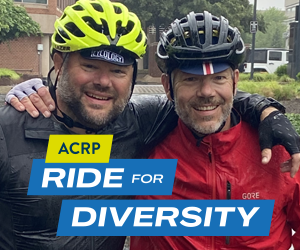Last year, ACRP Ride for Diversity cyclists Sergio Armani and Rick Fisher contended with an army of cicadas as they made their way more than 300 miles along the Great Allegheny Passage and C&O Canal trails from Pittsburgh, Pa. to Washington, D.C. and beyond. This year, they may be faced with giant spiders falling from the sky. No joke.
“It’s always something,” laughs Armani (at right in photo), vice president for business development in North America with Advarra. “I’m horrified of the spiders. If I see them, I’ll throw my bike in the woods and grab an Uber!”
Members of an invasive species of spider called the Large Joro, roughly the size of a half dollar coin, are expected to “parachute” into the East Coast this spring, researchers at the University of Georgia announced recently. The spiders could arrive sometime in May, perhaps just in time for Armani and fellow rider Fisher (at left in photo), senior director of operations for Velocity Clinical Research, to hit the trail May 15 for the second ACRP Ride for Diversity.
Officially ending at the ACRP headquarters in Alexandria, Va., across and a little way down the Potomac River from the C&O Canal trail’s eastern terminus in D.C.’s Georgetown neighborhood, the 334-mile ride raises funds to increase diversity in the clinical trials workforce, a cause both men are passionate about.
Armani is kidding about ditching his bike and hailing a cab. In all seriousness, he’s overwhelmed by the positive response both riders have received since their first such trek in 2021. “The fundraising each year has been phenomenal,” he says, noting that, between donations already received on GoFundMe and commitments made, they’re at nearly 80% of their $50,000 goal for 2022 with six weeks to go before the ride begins. In 2021, the effort raised nearly $25,000.
Armani and Fisher learned a few tricks along the way last year. For starters, they’ll pack less gear and won’t attempt any camping this time out. “Hotels and bed and breakfasts are the way to go,” Armani says.
The threat of spiders aside, Armani and Fisher have had other challenges this year. “We’ve both had a harder time training as much as we did last year,” Armani says. Fisher changed jobs and has been traveling more of late, while Armani has been a victim of poor local weather. “I’ll ride when it’s above 35 degrees and dry,” he says, but he’s experienced a rougher winter in 2022, curtailing some of his biking. “But I’ll be ready,” he promises.
A final piece of good news for both riders: The spiders reportedly are harmless to humans, with fangs too small to break the skin.
Author: Michael Causey



